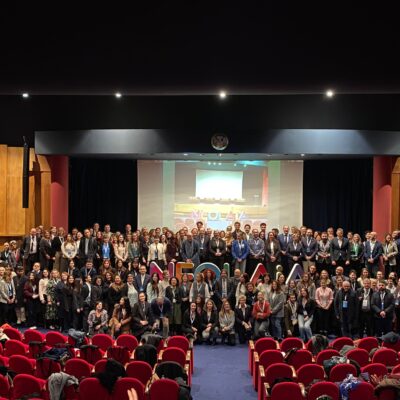Are certain animal species capable of empathic behaviour? How do populations react to climatic changes, and how does navigation by magnetism work in the animal kingdom? This summer, international scientists and students will come together at Bielefeld University for the world’s largest conference on behavioural research: Behaviour 2023. The university is expecting around 1,000 guests from 14 to 20 August. In addition to renowned plenary speakers, participants can expect a wide-ranging programme with symposia on various research topics. The Behaviour congress is the biennial main conference of the International Council of Ethologists (ICE).
‘We are very pleased to welcome colleagues from all over the world and to join them in discussing challenges and new approaches in behavioural research,’ says Professor Dr Oliver Krüger, head of the Department of Behavioural Research at Bielefeld University’s Faculty of Biology. ‘The fact that our application to host Behaviour 2023 has been accepted is also a great appreciation of our research work.’ Krüger is the spokesperson for the conference’s organizing team together with Professor Dr Barbara Caspers. ‘Here in Bielefeld, we are focusing particularly on how individualization succeeds in changing environments—we shall present the findings we have gained through applying this perspective in numerous lectures,’ says Caspers, who heads the Behavioural Ecology department.
International plenary speakers
In previous years, this major conference has been held in Newcastle (Great Britain), Cairns (Australia), Estroil (Portugal), and Chicago (USA). Bielefeld had already hosted the International Ethological Congress, as it was still called at the time, in 1977, and is thus the first university in the history of the ICE to host the conference for a second time.
In addition to Professor Dr Barbara Caspers from Bielefeld University, plenary speakers include biologist Professor Dr Gloriana Chaverri (Universidad de Costa Rica), biologist and primatologist Professor Dr Frans de Waal (Emory University, Atlanta, USA), evolutionary biologist and behavioural scientist Professor Devi Stuart-Fox PhD (School of BioSciences, University of Melbourne, Australia), biologist Dr Gladys Kalema-Zikusoka (CEO and founder of Conservation Through Public Health, Uganda), and biologist Dr Mauricio Cantor (Oregon State University, USA). The international experts will provide insights into their research.

© Bielefeld University /M. Adamski
Thirty-eight symposia will address different aspects of behavioural research ranging from classic topics such as plasticity, social behaviour, and communication to emerging topics such as microbiome research, animal emotions, and meta-analyses with large data sets. The organizers and invited speakers come from research institutions and universities in a wide range of countries including Australia, Austria, Belgium, Canada, Croatia, the Czech Republic, Denmark, Germany, the Netherlands, New Zealand, Spain, Switzerland, Tanzania, the UK, and the USA. The congress programme will be rounded off with excursions for participants – for example, to surrounding nature reserves. By keeping the conference fees comparatively low, the organizers want to enable as many scientists as possible on all career levels to take part in the congress and for students to be able to take part as well. Registration is possible via the conferencewebsite website. In addition, the following can be reached via the homepage: abstract submission (until the end of April), travel grant application (until the end of March), and call for workshops (until the end of March).
Held every two years, the Behaviour congress is the main conference of the International Council of Ethologists. It is supported by various organizations including the Association for the Study of Animal Behaviour (ASAB). The ASAB organizes conferences, awards scholarships to scientists and students, and publishes the journal Animal Behaviour.
Behavioural Research at Bielefeld University’s Faculty of Biology
The Chair of Behavioural Research at the Faculty of Biology comprises a team of more than 50 scientists. It studies animal behaviour within the framework of four-question theory according to Nikolaas Tinbergen. Currently, behavioural research at Bielefeld has a strong reputation for its laboratory studies on zebra finches and wild guinea pigs, its long-term field studies on birds of prey such as the buzzard and the goshawk, and research on seal species such as the Galapagos sea lion and the Antarctic fur seal. Under Professor Dr Klaus Immelmann, the chair, which was founded on 1 November 1973, developed into a leading international centre for behavioural research. Professor Dr Oliver Krüger has headed the chair since 2013. In 2020, the field of behavioural ecology was founded with Professor Dr Barbara Caspers at the helm. This has further strengthened the diversity of research topics at Bielefeld University. A current major project is the Collaborative Research Centre/Transregional Collaborative Research Centre ‘A Novel Synthesis of Individualisation across Behaviour, Ecology, and Evolution: Niche Choice, Niche Conformance, Niche Construction (NC³)’ (SFB/TRR 212), which was founded in 2018 by Bielefeld University and the University of Münster and is funded by the German Research Foundation (DFG). The research network ‘Individualisation in Changing Environments’ (InChangE) has been running since 2021 in cooperation with the University of Münster. It is funded by the Ministry of Culture and Science of the State of North Rhine-Westphalia.
Further information:
- Conference website
- Registration for the conference
- Website of the Association for the Study of Animal Behaviour




